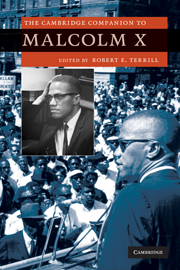Book contents
- Frontmatter
- Introduction
- 1 Malcolm X and Elijah Muhammad
- 2 Autobiography and identity: Malcolm X as author and hero
- 3 Bringing Malcolm X to Hollywood
- 4 Malcolm X and black masculinity in process
- 5 Womanizing Malcolm X
- 6 Malcolm X and the Black Arts Movement
- 7 Malcolm X and African American conservatism
- 8 Malcolm X and youth culture
- 9 Homo rhetoricus Afro-Americanus: Malcolm X and the “rhetorical ideal of life”
- 10 Judgment and critique in the rhetoric of Malcolm X
- 11 Nightmarish landscapes: geography and the dystopian writings of Malcolm X
- 12 Afrocentricity and Malcolm X
- 13 Malcolm X in global perspective
- 14 The legacy of Malcolm X
- Guide to further reading
- Index
5 - Womanizing Malcolm X
Published online by Cambridge University Press: 28 May 2010
- Frontmatter
- Introduction
- 1 Malcolm X and Elijah Muhammad
- 2 Autobiography and identity: Malcolm X as author and hero
- 3 Bringing Malcolm X to Hollywood
- 4 Malcolm X and black masculinity in process
- 5 Womanizing Malcolm X
- 6 Malcolm X and the Black Arts Movement
- 7 Malcolm X and African American conservatism
- 8 Malcolm X and youth culture
- 9 Homo rhetoricus Afro-Americanus: Malcolm X and the “rhetorical ideal of life”
- 10 Judgment and critique in the rhetoric of Malcolm X
- 11 Nightmarish landscapes: geography and the dystopian writings of Malcolm X
- 12 Afrocentricity and Malcolm X
- 13 Malcolm X in global perspective
- 14 The legacy of Malcolm X
- Guide to further reading
- Index
Summary
In the early stages of this project, I told a colleague that I had been asked to write an article about women and Malcolm X. She didn't directly respond to this news but her expression was a talking book which seemed to ask: Is there really anything more for a black feminist to say about Malcolm X? I understand the premise of the question. After all, black feminists and womanists have already sculpted the dominant theoretical narrative on Malcolm X. For example, in the 1980s and 90s, black feminists wrote a series of essays generally praising his political insight and excoriating his misogyny. Michelle Wallace, Audre Lorde, bell hooks, Angela Davis, Patricia Hill Collins, and Barbara Ransby, among others, depicted Malcolm X as a race leader who was either the precursor to the core of misogyny at the center of Black Power politics, a warrior among the various leaders of the civil rights and black nationalist organizations of the 1960s, or a religious figure whose ministerial vocation and penchant for truth-seeking may well have enabled him, had he lived, to become a champion for women's empowerment. Women writers in the Black Arts movement such as Maya Angelou, Alice Walker, and Sonia Sanchez saw Malcolm X as a black hero and praised his love for his people as well as his strength, courage, and intellectual integrity. More recently, scholars such as Tracye Williams and Farah Jasmine Griffin have argued that black women can love what Malcolm X stood for but they must still challenge the sexism reflected in his teachings and in the movements he inspired.
- Type
- Chapter
- Information
- The Cambridge Companion to Malcolm X , pp. 63 - 77Publisher: Cambridge University PressPrint publication year: 2010
- 1
- Cited by



